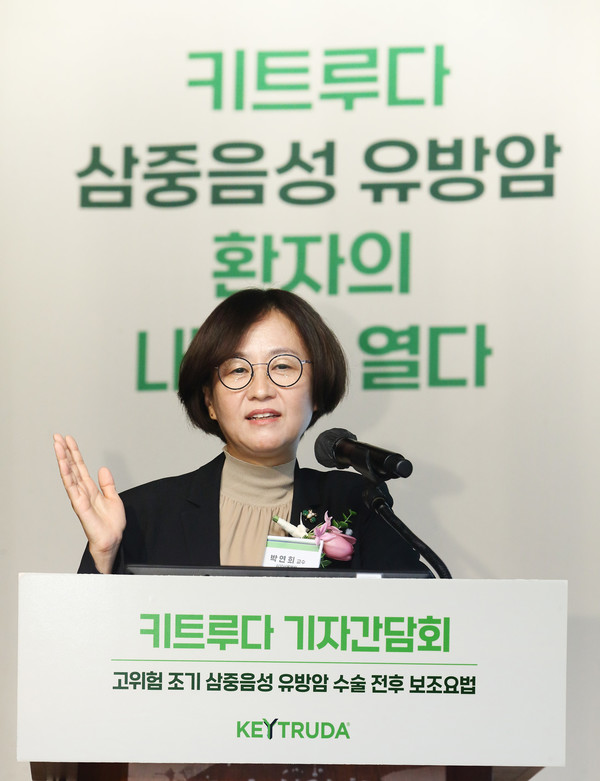MSD said Friday it expects the expanded indication of anti-PD-1 therapy Keytuda (pembrolizumab) as neoadjuvant therapy for triple-negative breast cancer (TNBC) to resolve unmet needs and help patients return to normal life early.
The company added that it won expanded indication to be used as neoadjuvant therapy in combination with chemotherapy before surgery in patients with triple-negative breast cancer (TNBC) and then continued as a single agent after surgery on July 13.
The latest indication allowed hospitals to use Keytruda to treat early and metastatic TNBC.

“Breast cancer attacks young women pivotal in society and at home, as a large share of patients are under 50,” Professor Park Yeon-hee of the Department of Hemato-oncology at Samsung Medical Center said during a media event hosted by MSD. “Notably, in the case of TNBC, it is difficult to use targeted therapy, and the possibility of metastasis and recurrence is high.”
According to Professor Park, the overall survival period of patients with stage 4 TNBC is only 12 months, and the percentage of patients with four-year survival is less than 20 percent.
“This is far lower than HER2-negative breast cancer’s median overall survival rate of close to 36 months and a four-year survival rate of 40 percent,” Park said. “Although TNBC exhibits such high aggression, there are limited treatment options compared to other types of invasive breast cancer due to its disease characteristics.”
Park explained that Keytruda, the first and only immunotherapy approved for neoadjuvant therapy in combination with chemotherapy before surgery in patients with TNBC, reduced the risk of all-cause events by 37 percent compared to placebo in phase 3 clinical study (KEYNOTE-522), significantly extended event-free survival (EFS) compared to the control group, and had a complete pathological response (pCR) of 64.8 percent at the median follow-up period of 15.5 months, showing a significant difference compared to 51.2 percent of chemotherapy alone.
“In recent guidelines on treating early TNBC, neoadjuvant therapy in combination with chemotherapy before surgery is becoming a standard treatment,” Park said. “Now, it has become very important to make good use of this opportunity to provide patients with additional treatment options.”
It is expected that early treatment of Keytruda, which has confirmed improvement in pCR and EFS, will open the possibility of a full cure for TNBC and lower the recurrence rate, she added.
During the news conference, MSD said that Keytruda had broadened the horizon of immunotherapy for not only metastatic but early TNBC in Korea.
“The company will work with medical staff and health authorities to help Keytruda, which innovated TNBC treatment, contribute to prolonging and improving the lives of TNBC patients in Korea,” MSD Korea Medical Director Kim Yo-han said. “The company will continue to address more unmet needs for cancer patients by using Keytruda in other female cancer fields such as endometrial and cervical cancer.”

